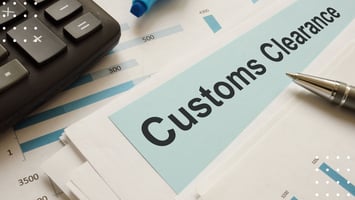International trade is a tricky process. When you import or export goods, you need to be...
Choosing A Customs Broker: Vetting Tips
When shipping across borders, you want to ensure that your goods are transported as efficiently and safely as possible. A customs broker is a critical player in this business, as they can help navigate import regulations and customs entry requirements. Customs regulations are constantly changing and becoming more stringent, creating a need for a reputable and effective broker. But before making a deal with a customs broker regarding a shipment, it is essential to know what to look for, to be able to vet out a good broker from a vast field of options.
-2.png?width=1640&height=924&name=Brown%20Microphone%20Simple%20Photography%20Podcast%20Show%20Brown%20Microphone%20Simple%20Photography%20Podcast%20Show%20Facebook%20Cover%20(11)-2.png)
In order to understand how to properly vet and research customs brokers, it is essential to be clear on what their role is and how they can help the customs clearance process. Customs brokers are essentially the connectors between traders and customs officials, helping transport goods across international borders with minimum hassle. When it comes to international imports, the broker’s role is to ensure all documentation is correct and submitted in a timely manner, as well as ensuring duties are paid. The brokers role contains a multitude of responsibilities, some key ones include;
- Preparing all the necessary paperwork or documents
- Calculating the duties or fees the shipment will incur
- Acting as a liaison between customs officials and shipper or importer
- Facilitating any necessary communication between government agencies and the importer
- Keeping up with regulations and ensure documents and shipment follow current laws
Logistically speaking, the customs broker has an important role in ensuring the shipment gets to its intended destination on time. They are trained to handle any potential mishaps or delays, so that issues can resolve quicker. They know what needs to be declared, how and where. Shipping, especially in large quantities, will most often benefit from the input and help of a broker.
What To Look For In A Customs Broker
With the ever-changing customs regulations, hiring a reliable customs broker is more important than ever. When you are choosing a broker, it is important to have a sense of what your needs are and what you are looking for in terms of partnership. It is essential that all brokers you are looking at are licensed, as you want to ensure you are working with somebody who legally can do the job. You want to research brokers and look at their pricing, history and activity, in order to weigh your decision. There are a few easy ways you can vet a broker and make sure they are the right fit.
Communication
You want to choose a broker who communicates well and is transparent with the process you are undergoing. You need a broker who will return your calls and inform you on where things stand, rather than somebody who you can’t reach when you need them. A broker who is worth your time will be communicative from the beginning and usually have a plan to help keep you in the loop every step of the process. You want to make sure their contact information is accessible, including after hours contact info, as this is one key sign that they are more likely to communicate. Remember that the carrier needs to be able to contact the broker in case of issue.
If you are looking for a list of licensed brokers and their up to date contact information, for Canadian and U.S. brokers, you can access the Zipments.io Customs Broker Directory.
Experience With Your Shipment
You ideally want to seek out a broker who has experience with your type of freight or goods, as this means that they know how to navigate the clearance aspect and will know the rules or regulations in place for your shipment. Since rules and regulations often change, a broker experienced in this area will be up to date. Some goods are harder to clear or require more paperwork or special additional paperwork (ie: FDA approval paperwork.) in order to clear customs, so it will be important to work with a broker who can get in touch with the relevant government agencies.
Prioritizes Your Shipment
Brokers are busy and usually have a lot of shipments to deal with, on a regular basis. However, when choosing a broker for your shipment, you want to inquire into their current workload and how many shipments they may be managing at one time. You likely want to avoid a broker who has a lot of shipments, as it means that their focus and time may not be balanced enough and they could end up making an error or losing track. A broker dealing with a large company with high value shipments is more likely to prioritize their time with them and not a medium or smaller sized business, so be sure to look for a broker who can take care of your needs.
Will Draw Up a Contract
A good customs broker should be able to provide you with a clear contract stipulating your terms and agreement for working together. In the early discussions, a good broker should be able to provide you a document that is a terms and conditions type agreement for your partnership. This outlines the boundaries and working expectations, so that in case anything goes wrong, disputes are avoided or easily resolved.
Technologically In Tune
You want to choose a broker who has been able to adapt with the times and partakes in electronic filing and billing. Customs in both US and Canada require electronic filing for clearance, but you also want a broker who can provide updates and communication using technology, for both time and efficiency purposes. This allows you to get in touch and keep track of your shipment a little more easily.
Office Location Proximity
You ideally want a broker who has an office located close to the ports where your shipment may be heading. Not only for convenience, but for safety and efficiency with your shipment. Documents are less likely to get lost if there are less hands on them, so having a broker who is near where you need them is beneficial.
Solid Reputation
In the research process for a customs broker, you want to ensure that you check reviews or testimonials, and see how other clients have worked with them in the past. However, often brokers may have confidentiality agreements in place, so reviews from clients could be harder to find. Nonetheless, usually online there will be reviews for the brokerage or broker, and you may even ask for references when you are seeking one out. Companies who have been around for a long time and offer other types of services as well, likely have been able to grow due to their ability and effort over time. It is always beneficial to go with a reputable company, rather than somebody completely unknown to you.
Customs regulations are constantly shifting, and you can't afford to work with an unreliable customs broker. A good customs broker will be able to advise you on how to get your goods across borders in the most efficient way. Make sure you know all the ins and outs of your broker before you hire them. Not only do you want to connect with a person who can help you through a difficult situation, but it is also important that they are able to answer any of your questions.



